Rosehip oil has become the latest buzzword in the skincare industry, with dermatologists and beauty enthusiasts alike raving about its numerous benefits for the skin. Extracted from the seeds of the wild rose bush, this versatile oil has been used for centuries by indigenous people for its healing properties. From treating acne to reducing the appearance of fine lines and wrinkles, rosehip oil has a range of benefits that make it a must-have in your skincare routine. In this blog, we delve into the world of rosehip oil, exploring its various benefits, uses, and how to incorporate it into your daily regimen. So, get ready to discover the secret to glowing, radiant skin with rosehip oil.
What is Rosehip Oil?
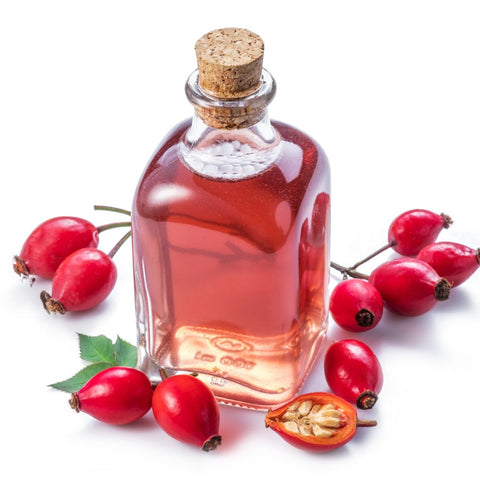
Rosehip oil is a natural, plant-based oil extracted from the seeds of wild rose bushes, specifically the Rosa Canina species. The oil is rich in essential fatty acids, vitamins, and antioxidants, making it a potent ingredient for promoting healthy skin. Unlike other oils, rosehip oil is easily absorbed into the skin, delivering its nourishing and rejuvenating benefits deep into the tissues. The oil has a light, non-greasy texture, making it suitable for all skin types, including sensitive skin. In recent years, rosehip oil has gained popularity for its numerous skincare benefits, from treating acne to improving skin hydration and reducing the appearance of fine lines and wrinkles. So, if you're looking for an all-natural solution to enhance your skincare routine, rosehip oil is a must-try.
The History and Origin of Rosehip Oil

Rosehip oil, derived from the seeds of wild rose bushes, has a long history that spans generations and cultures. Here is a summary of its history and origin:
-
Rosehip oil has been used since ancient times, including by the Egyptians, Mayans, and Native Americans. These cultures recognised its therapeutic properties and used it to treat a wide range of skin conditions and ailments.
-
In traditional medicine practices, rosehip oil was valued for its healing properties. Its moisturising and anti-inflammatory properties allowed it to be applied topically to treat and relieve skin conditions such as acne, dermatitis, and eczema.
-
Indigenous communities in areas where wild roses grow naturally, such as Chile and the Andes Mountains, have long used rosehip oil for medicinal purposes. They would extract the oil from the seeds of wild rose bushes and use it to nourish the skin and hair.
-
In the 20th century, scientific research began to uncover the therapeutic properties of rosehip oil. Studies confirmed its high content of vitamins, antioxidants, and essential fatty acids, making it a valuable ingredient in skincare products. Its ability to promote collagen production, fade scars, and improve skin texture has made it popular in modern skincare routines.
-
Rosehip oil became popular in the cosmetics industry as a natural alternative to synthetic skincare ingredients. Its ability to hydrate and rejuvenate the skin makes it a popular ingredient in moisturisers, serums, and anti-aging products.
-
The demand for rosehip oil has increased as people become more interested in natural and sustainable skincare options. The ecosystems in which rosehips grow are preserved, and local communities that depend on the wild rosehip harvest are assisted by efforts to harvest rosehips sustainably.
Extraction Methods and Their Impact on Quality
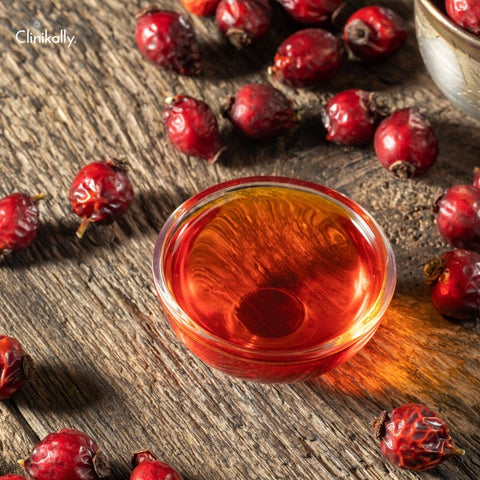
The method of extraction used to obtain rosehip oil can have a significant impact on its quality. Here are some of the most common extraction methods and how they affect oil quality:
-
Cold-pressing is the most common method of extracting rosehip oil. It involves pressing the rosehip seeds at low temperatures to extract the oil. This method helps the oil retain its natural properties, such as vitamins, antioxidants, and fatty acids. Cold-pressed rosehip oil is generally of high quality and is preferred for skincare due to its purity and potency.
-
Solvent extraction uses solvents such as hexane to dissolve the oil from rosehip seeds. While this method produces more oil than cold-pressing, there is a risk of solvent residue remaining in the final product, which may compromise its purity and safety. Additionally, solvent extraction may remove some of the oil's beneficial compounds, resulting in lower-quality oil.
-
Supercritical CO2 extraction is a more advanced method for extracting oil from rosehip seeds. This method is extremely efficient and provides precise control over the extraction process. Supercritical CO2 extraction produces high-quality oil with minimal nutrient loss and no solvent residue. It is regarded as one of the most effective extraction methods for preserving the oil's original properties.
-
Distillation is the process of heating rosehip seeds to vaporise the oil, which is then condensed and collected. While distillation can be used to extract rosehip oil, it is not as popular as cold pressing or supercritical CO2 extraction for skincare. This method may cause some loss of heat-sensitive compounds and result in lower-quality oil than cold-pressing.
Key Components and Their Skin Benefits
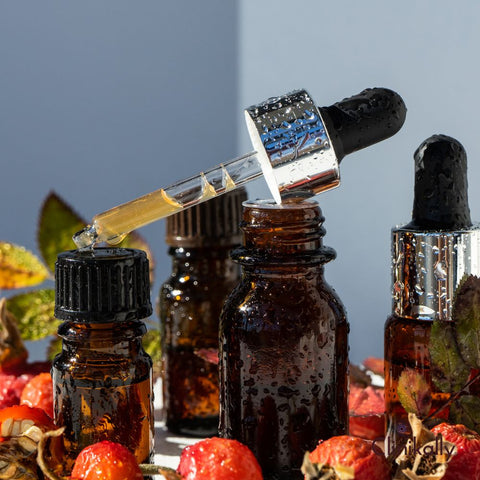
Rosehip oil is well-known for its high concentration of beneficial components, each of which offers unique skin benefits. Here are some key components of rosehip oil and their respective skin benefits:
-
Essential Fatty Acids (EFAs): Rosehip oil is abundant in essential fatty acids, including linoleic acid (omega-6) and linolenic acid (omega-3). These fats contribute to better hydration, less moisture loss, and preservation of the skin's barrier function. They are also useful for relieving sensitive or irritated skin because they have anti-inflammatory qualities.
-
Vitamins: Vitamins A, C, and E are especially abundant in rosehip oil. Retinol, or vitamin A, helps reduce hyperpigmentation and scars by encouraging the formation of collagen and supporting the turnover of skin cells. Strong antioxidant vitamin C balances skin tone, brightens the skin, and guards against free radical damage to the environment. Vitamin E improves skin hydration, reduces oxidative stress, and supports skin regeneration and repair.
-
Antioxidants: In addition to vitamins A, C, and E, rosehip oil contains beta-carotene, lycopene, and flavonoids. These antioxidants help to neutralise free radicals, which can lead to premature ageing and skin damage. They contribute to the oil's anti-aging properties while also maintaining skin elasticity and firmness.
-
Phenols: Antioxidant and anti-inflammatory phenolic compounds are present in rosehip oil. These substances lessen inflammation, shield the skin from outside aggressors, and enhance general skin health.
-
Phytosterols: Rosehip oil contains phytosterols, like beta-sitosterol, which improve moisture retention, strengthen the skin barrier, and lessen inflammation. Their ability to soothe irritated or sensitive skin is another advantage.
-
Carotenoids: Carotenoids are precursors to vitamin A and the pigments that give the oil its orange-red colour. They support skin regeneration and repair and add to the antioxidant activity of the oil.
-
Triterpenoids: Triterpenoids, like triterpene alcohols, are found in rosehip oil and can reduce inflammation and promote the healing of wounds. They can soothe and repair damaged skin, making rosehip oil useful for eczema and dermatitis.
How to Use Rosehip Oil in Your Skincare Routine
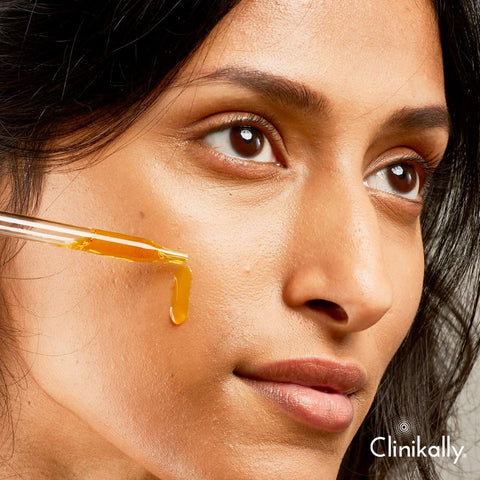
Rosehip oil is a versatile ingredient that can be used in a variety of ways to enhance your skincare routine. Here are a few tips on how to use rosehip oil for the best results:
-
As a standalone oil: To use rosehip oil as a standalone product, simply apply a few drops to your face and massage it into your skin until it is absorbed. This can be done morning and night for maximum benefits.
-
In combination with other products: Rosehip oil can be combined with other skincare products, such as serums and moisturizers, to boost their benefits. Simply mix a few drops of rosehip oil with your favourite product before applying it to your face.
-
As a spot treatment: For targeted treatment of specific skin concerns, such as acne or dark spots, rosehip oil can be applied as a spot treatment. Simply apply a small amount of oil to the affected area and massage it in until it is absorbed.
-
As a hair treatment: Rosehip oil can also be used to improve the health of your hair. Simply massage a few drops into your scalp and hair and leave it on for 30 minutes to an hour before washing it off.
Regardless of how you use it, it's important to remember that a little goes a long way with rosehip oil. Start with a small amount and increase as needed, taking care not to overuse the oil, which can lead to clogged pores and breakouts.
Proper Application Techniques for Maximum Benefit
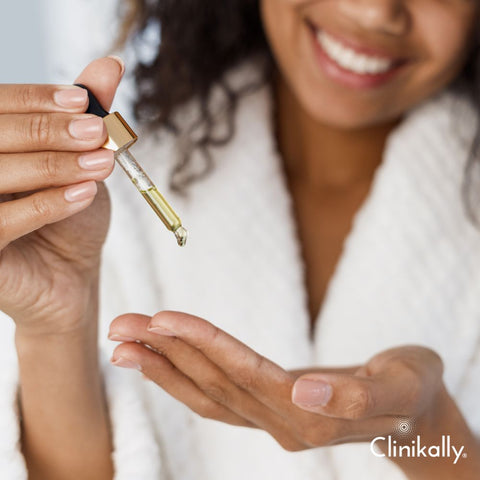
Rosehip oil must be applied correctly to reap its full benefits for your skin. Here are some recommended techniques for using rosehip oil effectively:
-
Before applying rosehip oil, make sure your skin is cleansed and free of makeup, dirt, and impurities. Cleaning your skin beforehand helps the oil penetrate more effectively and prevents clogged pores.
-
Rosehip oil is concentrated, so you only need a small amount for each application. Begin with 2-3 drops of oil and adjust as needed to match your skin's moisture levels and preferences.
-
You can slightly warm the oil by rubbing it between your fingers or palms. This helps to increase absorption and spreadability.
-
Use your fingertips to gently massage the oil into your skin in upward, circular motions. Focus on areas where you want to target specific concerns, such as dry patches, fine lines, or areas of hyperpigmentation.
-
Before using any more skincare products or makeup, give the oil time to absorb into your skin. This enables the oil to absorb completely and offer its full range of advantages.
-
There are several applications for rosehip oil in your beauty regimen. You can use it alone as a moisturiser or serum, or add a few drops to your favourite moisturiser or facial oil for extra hydration and nourishment. It can also be used under sunscreen during the day and heavier creams at night to add moisture.
-
To achieve the best results, incorporate rosehip oil into your skincare routine regularly. Use it daily or as needed to keep your skin hydrated, improve its texture, and address specific issues over time.
-
Before applying rosehip oil to your face, perform a patch test on a small area of skin to rule out any allergic reactions or sensitivities.
By using these application techniques, you can effectively maximise the benefits of rosehip oil for your skin, promoting a healthy, glowing complexion over time.
Combining Rosehip Oil with Other Skincare Products
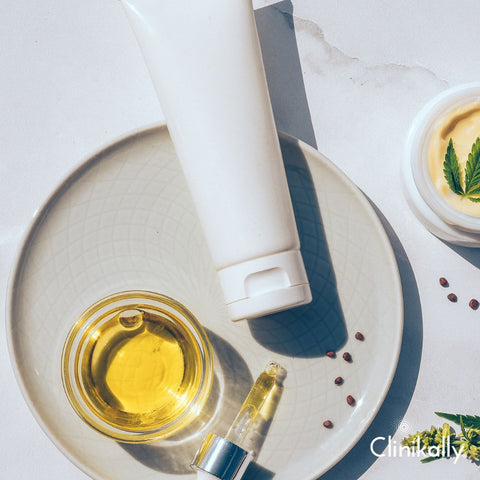
Combining rosehip oil with other skincare products can boost its benefits and address multiple skin concerns at once. Here are some effective ways to include rosehip oil in your skincare routine alongside other products:
-
Moisturisers: Add a few drops of rosehip oil to your favourite moisturiser to increase its hydration and nourishing properties. This combination can provide long-lasting moisture while also locking in the benefits of both products, leaving your skin soft, smooth, and supple.
-
Serums: Layering rosehip oil with a hydrating serum can improve its absorption and effectiveness. Apply the serum first to get the active ingredients deep into the skin, then follow with rosehip oil to lock in moisture and provide extra nutrients and antioxidants.
-
Facial Oils: If you already use facial oils in your skincare routine, try combining them with rosehip oil for extra benefits. Mix equal parts of rosehip oil with oils like jojoba, argan, or squalane to create a customized blend tailored to your skin's needs. This can help address a variety of issues, including hydration, inflammation, and ageing.
-
Essences or Toners: After using an essence or toner, apply rosehip oil to seal in moisture and hydration. Simply apply a few drops of oil to your skin while it is still slightly damp to help lock in moisture from previous skincare steps.
-
Sunscreen: Applying rosehip oil after sunscreen can provide additional hydration and antioxidant protection. Allow the oil to fully absorb into your skin before applying sunscreen for optimal UV protection. This combination can help keep your skin moisturized and shielded from environmental damage.
-
Retinol or Exfoliating Treatments: If you use retinol or other exfoliating treatments in your skincare routine, following them with rosehip oil can help soothe and replenish the skin. These treatments can sometimes cause dryness or irritation, so applying rosehip oil afterwards can help restore balance and reduce potential side effects.
-
Sheet Masks: Before applying your favourite sheet mask to your face, add a few drops of rosehip oil. This can boost the mask's moisturising and nourishing properties, leaving your skin feeling deeply hydrated and rejuvenated after use.
When combining rosehip oil with other skincare products, it is critical to monitor how your skin reacts and adjust your routine accordingly. Experiment with different combinations to see what works best for your skin type and concerns. Remember to patch-test new products to avoid allergic reactions or sensitivities.
Precautions and Tips for Sensitive Skin Types
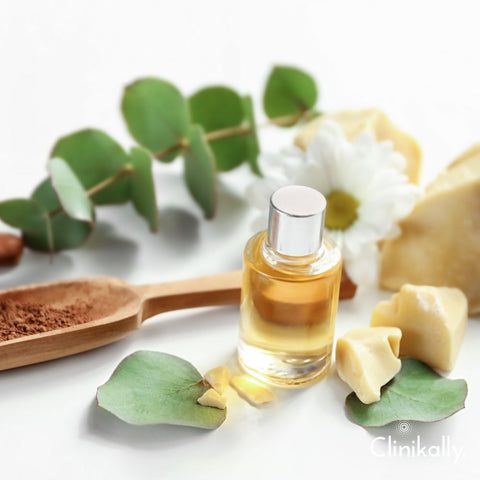
If you have sensitive skin, you should exercise caution when using skincare products, including rosehip oil. Here are some tips and precautions for including rosehip oil in your skincare routine if you have sensitive skin:
-
Patch Test: Test a small area of skin, like the inner arm or the area behind your ears, with rosehip oil before putting it on your face. This will assist you in identifying any allergies or sensitivity issues you may have with the oil before using it on a broader portion of your face.
-
Start Gradually: If the patch test is positive and you choose to use rosehip oil in your daily skincare regimen, proceed cautiously at first. Begin with a small amount of oil and gradually increase as your skin adjusts. This can help to reduce the risk of irritation or adverse reactions.
-
Choose High-Quality Oil: Look for high-quality, cold-pressed rosehip oil that is free of additives, fragrances, and other potential allergens. Pure, unrefined rosehip oil is less likely to cause sensitivity reactions than products containing additional ingredients.
-
Mix with a Carrier Oil: If rosehip oil alone is too strong for your sensitive skin, dilute it with a gentle carrier oil like jojoba or sweet almond. This can help reduce the concentration of active ingredients while still providing hydration and nourishment to the skin.
-
Avoid Fragrance and Harsh Ingredients: Exercise caution when using other skincare products in conjunction with rosehip oil. Avoid products containing fragrances, alcohol, harsh exfoliants, or other irritants that may aggravate sensitivity.
-
Monitor Skin Reactions: Keep track of how your skin reacts to rosehip oil. If you experience redness, itching, burning, or any other signs of irritation, stop using it right away and see a dermatologist. It is critical to listen to your skin's feedback and modify your skincare routine accordingly.
-
Use Sunscreen: Rosehip oil contains natural vitamin A, which can make your skin more sensitive to sunlight. If you use rosehip oil during the day, follow it with a broad-spectrum sunscreen to protect your skin from UV rays.
-
Consult a Dermatologist: If you have ongoing skin concerns or are unsure about using rosehip oil on sensitive skin, see a dermatologist for personalised recommendations and advice.
By taking these precautions and tips, you can safely incorporate rosehip oil into your skincare routine and reap its benefits without exacerbating sensitivity or causing irritation.
Advantages of Rosehip Oil for Skin

Rosehip oil has several advantages that make it a great addition to your skincare routine. Some of the key benefits of rosehip oil for your skin include:
-
Rosehip oil for Acne: Rosehip oil is rich in antioxidants and anti-inflammatory compounds, which help to reduce the appearance of acne and breakouts.
-
Hydrates the Skin: Rosehip oil is a natural emollient, meaning it helps to keep the skin hydrated and moisturized.
-
Reduces the Appearance of Fine Lines and Wrinkles: The high levels of antioxidants and essential fatty acids in the rosehip oil help to reduce the appearance of fine lines and wrinkles, leaving your skin looking youthful and radiant.
-
Improves Skin Texture: The essential fatty acids in the rosehip oil help to improve skin texture and tone, giving you a smoother, more even complexion.
-
Promotes Healing: The anti-inflammatory properties of rosehip oil help to soothe and calm irritated skin, making it an excellent ingredient for post-inflammatory hyperpigmentation, sunburn, and other skin conditions.
-
Non-Comedogenic: Rosehip oil has a low comedogenic rating, meaning it is unlikely to clog pores and cause breakouts.
-
Suitable for All Skin Types: Rosehip oil is suitable for all skin types, including sensitive skin, making it a versatile ingredient in any skincare routine.
So, whether you're looking to hydrate dry skin, reduce the appearance of fine lines and wrinkles, or treat acne, rosehip oil is an excellent choice. You can now consult dermatologist online to get personalized treatment plan delivered directly to your doorstep for all your skin & hair concerns.
Rosehip Oil for Face: Usage and Effects
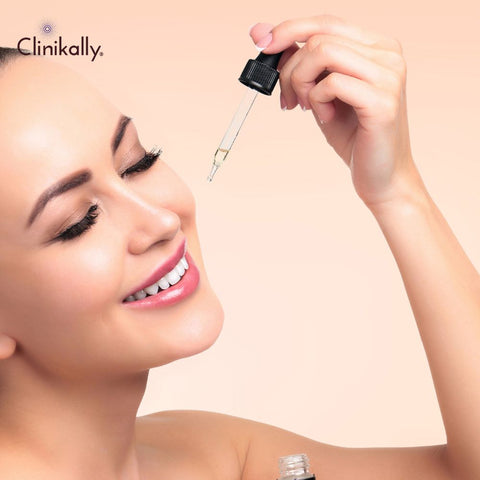
Rosehip oil is a popular natural oil made from the seeds of wild rose bushes, specifically Rosa moschata and Rosa rubiginosa. It is known for its numerous skincare benefits, particularly for the face. Here's how to use it and what the effects are:
Usage:
-
Cleansing: Massage a small amount of rosehip oil into your face in circular motions. This aids in the removal of impurities such as dirt and makeup.
-
Moisturising: After cleansing, apply a few drops of rosehip oil to your fingertips and gently pat it on your face. It can be used alone as a moisturiser or combined with your regular moisturiser to provide additional hydration.
-
Targeted Treatment: Apply a drop of rosehip oil directly to problem areas, such as scars, fine lines, or dry skin.
-
Makeup Primer: Apply rosehip oil as a natural primer before applying makeup. It creates a smooth canvas for makeup application and can extend its longevity.
-
Night Treatment: Use rosehip oil liberally on your face before going to bed as an overnight treatment. This allows the oil to deeply nourish and heal your skin while you sleep.
Effects:
-
Moisturises: Rosehip oil contains fatty acids like linoleic acid and oleic acid, which help hydrate and moisturise the skin.
-
Brightens Skin: It contains vitamins A and C, both of which have brightening properties that can help improve the skin's overall appearance and complexion.
-
Evens Skin Tone: Using rosehip oil regularly can help to even out skin tone and reduce hyperpigmentation, dark spots, and acne scars.
-
Scars and Stretch Marks: Rosehip oil contains vitamin A, which promotes skin regeneration and can help fade scars, stretch marks, and other imperfections over time.
-
Anti-Aging: Rosehip oil contains antioxidants that help fight free radicals and prevent premature ageing. It can help to minimise the appearance of wrinkles, fine lines, and other signs of ageing.
-
Soothes Irritation: Rosehip oil has anti-inflammatory properties that can help reduce redness, irritation, and inflammation, making it ideal for people with sensitive skin.
Side Effects of Rosehip Oil on Skin and How to Avoid Them
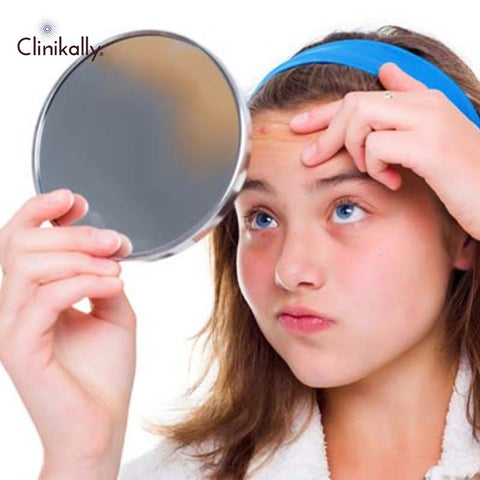
Rosehip oil is considered safe for most people to use on their skin, but some may experience side effects such as:
-
Skin irritation: Some people may experience itching, redness, or rash after using rosehip oil. This is most likely due to an allergy or sensitivity to one of the ingredients in the oil.
-
Breakouts: In some cases, using rosehip oil can cause breakouts, especially in people with oily or acne-prone skin. This is because the oil can clog pores and trap bacteria.
-
Discoloration: Using rosehip oil in high concentrations or using a product that contains impurities can lead to discoloration of the skin.
It's always advisable to do a patch test on a small area of skin before using a new product to make sure you don't have an adverse reaction. If you experience any side effects, stop using the product and consult a dermatologist if necessary.
Exploring the Versatility of Rosehip Oil Beyond Skincare

Rosehip oil's versatility extends beyond skincare, making it an effective ingredient in a variety of other applications. Here are some ways to discover the versatility of rosehip oil:
- Rosehip oil can help to nourish and condition the hair and scalp. Apply a few drops of oil to the ends of damp hair to reduce frizz and add shine. You can also massage rosehip oil into your scalp to moisturise and soothe dry, itchy skin, as well as promote healthy hair growth.
- Massage rosehip oil into your nails and cuticles to moisturise and strengthen them. The oil's hydrating properties can help prevent dryness, cracking, and brittleness, resulting in healthy, vibrant nails.
- Rosehip oil's lightweight texture and moisturising properties make it ideal for massage. Combine rosehip oil with other carrier oils and essential oils to create a massage blend that is specific to your needs. The oil's antioxidant and anti-inflammatory properties can help soothe sore muscles and promote relaxation.
- Rosehip oil is effective at removing makeup, including waterproof mascara and long-wearing foundation. Apply a small amount of oil to a cotton pad and gently remove makeup from your face and eyes. The oil's nourishing properties will leave your skin feeling soft and hydrated without removing natural oils.
- Use rosehip oil to moisturize and nourish dry, chapped lips. Apply a drop of oil directly to your lips or combine it with your favourite lip balm for added hydration. The oil's emollient properties will soften and smooth the lips, making them appear healthy and supple.
- Incorporate rosehip oil into your DIY beauty formulations to create personalised skincare, hair care, and body care products. Rosehip oil can be used as a base oil for homemade lotions, creams, serums, balms, and other products, allowing you to customise them to meet your specific needs and preferences.
- Rosehip oil's light, floral scent can be used in aromatherapy to help people relax and reduce stress. Add a few drops of rosehip oil to a diffuser or oil burner to fill the room with its relaxing aroma. You can also blend rosehip oil with other essential oils like lavender or chamomile for a calming and aromatic experience.
By expanding the uses of rosehip oil beyond skincare, you can incorporate this natural ingredient into a variety of aspects of your self-care routine, including hair and nail care, aromatherapy, and DIY beauty formulations.
Rosehip Oil in Hair Care: Benefits and How to Use
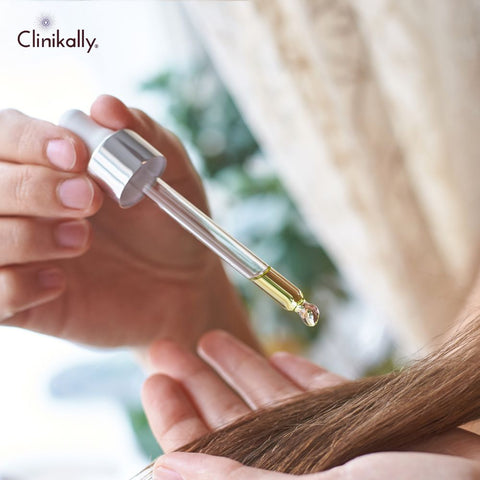
Rosehip oil provides numerous hair care benefits due to its high concentration of essential fatty acids, vitamins, and antioxidants. Here are some of the advantages of using rosehip oil in hair care and how to incorporate it into your daily routine:
-
Moisturises and hydrates: Rosehip oil is lightweight and easily absorbed, making it an excellent hair and scalp moisturiser. It hydrates dry, brittle hair, making it softer, smoother, and more manageable.
-
Nourishes the Scalp: Rosehip oil contains vitamins and antioxidants that nourish the scalp, promoting healthy hair growth while reducing dandruff and scalp irritation. Massage rosehip oil into the scalp to boost circulation and stimulate hair follicles.
-
Strengthens Hair: Rosehip oil contains fatty acids such as omega-3 and omega-6, which help strengthen the hair shaft and prevent breakage and split ends. Regular use of rosehip oil can improve your hair's overall health and resilience.
-
Increases Shine: Rosehip oil contains natural antioxidants that help to seal the hair cuticle, resulting in smoother, shinier hair. It can also help reduce frizz and flyaways, leaving your hair looking healthy and glossy.
-
Protects Against Damage: Rosehip oil contains antioxidants that help protect the hair from environmental damage and UV radiation. Using rosehip oil as a pre-styling treatment can protect your hair from heat styling tools while also preventing sun and pollution damage.
How to Use Rosehip Oil in Hair Care:
-
Pre-Shampoo Treatment: Before shampooing, apply rosehip oil to dry or damp hair to moisturise and protect it. Focus on the mid-lengths and ends, avoiding the roots if you have oily hair. Leave the oil on for 15-30 minutes, or overnight for extra hydration, before shampooing and conditioning as usual.
-
Leave-In Conditioner: After washing and conditioning your hair, use a small amount of rosehip oil as a leave-in conditioner. Concentrate on the ends to help seal in moisture and protect from heat styling. Avoid using too much oil to avoid weighing down your hair.
-
Scalp Massage: Apply a few drops of rosehip oil to the scalp to nourish the hair follicles and improve circulation. Use your fingertips to massage the oil in gentle, circular motions for a few minutes, then leave it on for at least 30 minutes before shampooing.
-
Styling Aid: Use rosehip oil to smooth frizz and add shine to your hair. Rub a small amount of oil between your palms and apply it to dry hair to control flyaways and add a glossy finish.
-
Hair Mask: Make a homemade hair mask by combining rosehip oil with nourishing ingredients such as honey, yoghurt, and avocado. Apply the mask to damp hair, focusing on the lengths and ends, and leave it on for 30 minutes to an hour before shampooing and conditioning as usual.
The Role of Rosehip Oil in Nail Health and Cuticle Care
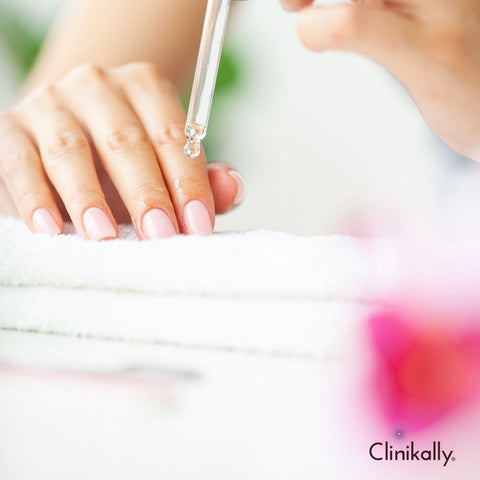
Rosehip oil's hydrating, nourishing, and protective properties make it useful for nail health and cuticle care. Here's how rosehip oil can help maintain healthy nails and cuticles:
-
Moisturizes and Hydrates: Rosehip oil is rich in essential fatty acids and vitamins that help moisturize and hydrate the nails and cuticles. Regular application of rosehip oil can help prevent dryness, cracking, and brittleness, keeping your nails looking healthy and strong.
-
Strengthens Nails: Rosehip oil contains fatty acids, like omega-3 and omega-6, which support and improve nail growth. Rosehip oil can help strengthen and enhance the general condition of your nails by feeding and moisturising the nail bed, which lowers the likelihood of breakage and splitting.
-
Nourishes Cuticles: Massaging rosehip oil into the cuticles helps nourish and soften them, making it easier to push them back gently and maintain their shape. Healthy cuticles are critical for protecting the nails from infection and maintaining their overall health and appearance.
-
Protects Against Damage: Rosehip oil contains antioxidants that help protect the nails and cuticles from environmental damage and free radicals. Applying rosehip oil on a regular basis can help protect your nails from harsh weather, UV radiation, and chemicals found in cleaning products.
-
Promotes Healing: Rosehip oil can help heal and soothe damaged or irritated cuticles. Its anti-inflammatory and regenerative properties can reduce pain and promote healthy tissue repair.
Incorporating Rosehip Oil into Homemade Beauty Products
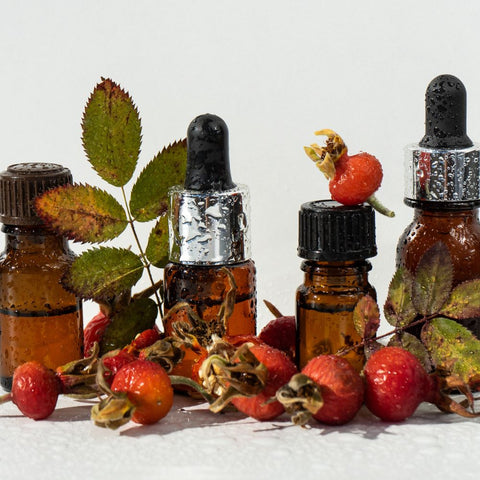
Incorporating rosehip oil into homemade beauty products can boost their nourishing, moisturising, and rejuvenating properties. Here are some ideas for adding rosehip oil to your DIY beauty formulations:
-
Facial Serum or Oil Blend: Make your own facial serum or oil blend by combining rosehip oil with other skin-loving oils such as jojoba oil, argan oil, and evening primrose. Add a few drops of essential oils, such as lavender or frankincense, for extra fragrance and skincare benefits. This combination can be applied as a moisturiser, anti-aging treatment, or overnight facial treatment.
-
Hydrating Face Mask: Combine rosehip oil with honey, yoghurt, mashed avocado, or oatmeal to make a hydrating face mask. Apply the mask to clean skin, leave it on for 15-20 minutes, and rinse with warm water. This mask will make your skin feel soft, smooth, and refreshed.
-
Body Lotion or Cream: Mix rosehip oil into your homemade body lotion or cream to provide deep hydration and nourishment to the skin. Combine it with shea butter, cocoa butter, coconut oil, and aloe vera gel for a luxurious moisturizer that will leave your skin feeling silky smooth.
-
Lip Balm: To relieve and hydrate dry, chapped lips, add rosehip oil to your homemade lip balm recipe. Mix it with beeswax, coconut oil, and a few drops of vitamin E oil for a nourishing lip balm that will keep your lips soft and hydrated.
-
Hair Mask or Conditioner: For a hydrating hair mask or conditioner, combine rosehip oil with honey, yoghurt, mashed banana, or coconut milk. Apply the mixture to damp hair, let it sit for 30 to 60 minutes, and then thoroughly rinse. This treatment will nourish and repair dry, damaged hair, making it shiny and manageable.
-
Cuticle Oil: Make a homemade cuticle oil by combining rosehip oil with other moisturising oils such as jojoba oil and vitamin E. Apply the oil to your cuticles and nails every day to keep them soft, hydrated, and healthy.
-
Under Eye Cream: For a nourishing under eye cream, combine rosehip oil with shea butter, coconut oil, and aloe vera gel. Apply the cream gently around the eyes to hydrate the delicate skin, reduce puffiness, and diminish the appearance of fine lines and wrinkles.
When incorporating rosehip oil into homemade beauty products, keep them in airtight containers away from direct sunlight to maintain their freshness and effectiveness. Experiment with different formulations and ingredients to create personalised beauty products that address your specific skincare needs and preferences.
Embracing Rosehip Oil for Holistic Skin Health
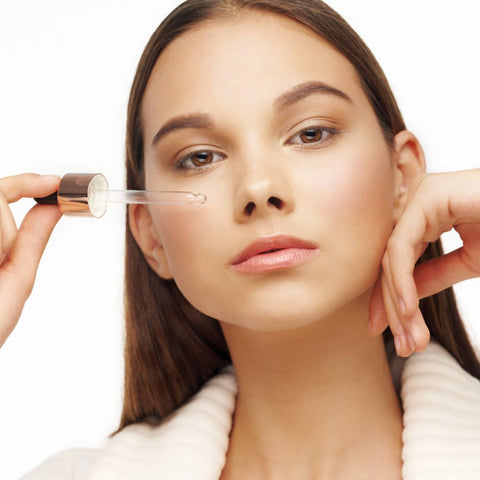
Embracing rosehip oil for holistic skin health can lead to nourished, radiant skin. Its high concentration of essential fatty acids, vitamins, antioxidants, and other beneficial compounds makes it an adaptable and effective skincare ingredient. By incorporating rosehip oil into your daily regimen, you can experience a wide range of benefits, including improved hydration, enhanced elasticity, reduced inflammation, and a more even complexion. The benefits of rosehip oil for hair care, nail health, and general wellbeing also go beyond skincare. Whether used alone or in combination with other natural ingredients, rosehip oil has the power to rejuvenate and revitalize your skin, leaving it looking and feeling its best.
Takeaway: Why You Should Start Including Rosehip Oil in Your Skincare
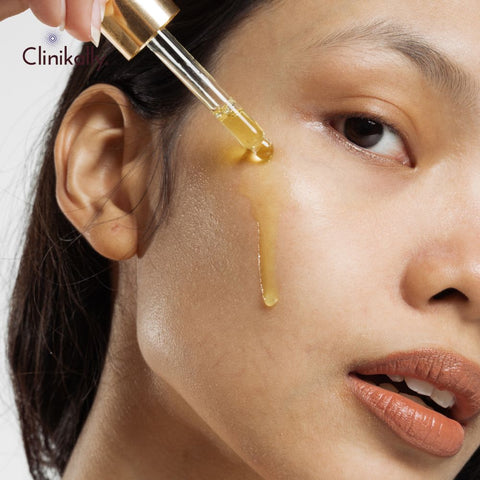
Incorporating rosehip oil into your skincare routine can bring a multitude of benefits to your skin. It's natural, versatile, and effective in hydrating and moisturizing the skin, reducing the appearance of fine lines and wrinkles, treating acne, improving skin texture, and promoting healing. With its numerous benefits, rosehip oil is a must-have ingredient for anyone looking to achieve healthy, radiant skin. Whether used as a standalone product or as part of a comprehensive skincare routine, rosehip oil is a simple and effective way to enhance your skin's natural beauty.
































